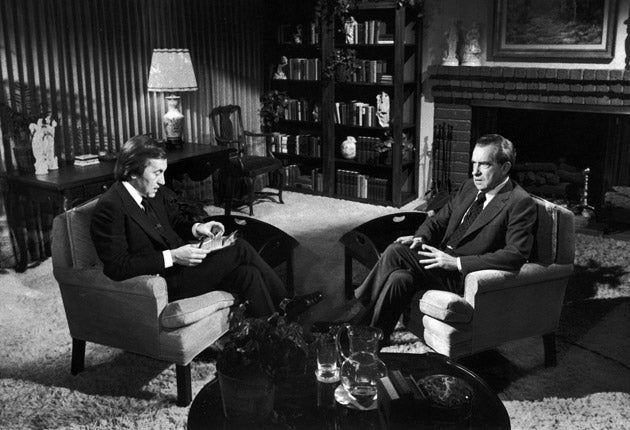The Weekend's TV: Frost on Nixon, Sat, BBC2<br/>Doctor Who, Sat, BBC1
Too many questions, not enough answers

It always gets a bit hall of mirrors when television makes programmes about television programmes and the effect was compounded in Frost on Nixon, both by the fact that the subject has already undergone the refracting makeover of dramatisation (in Peter Morgan's Frost/Nixon, shown later on the same evening) and by the unchanging screen grammar of the face-to-face interview.
So, as Joan Bakewell asked David Frost questions about the time he asked Richard Nixon questions, their reaction shots and cutaways were echoed in the illustrative clips from the original programme. What was significantly different was the mood of these two interrogations. In 1977, Richard Nixon was in the dock – Frost's long series of interviews being the closest the American people ever got to a judicial cross-examination. On Saturday, David Frost was comfortably occupying a throne of honour, a knight of the clipboard invited to relive his most historic combat.
Was it really that good an interview? There's no doubting its significance then. The audience was huge and its appetite for the minutiae of Watergate detail sizeable too. It went out to an audience well-schooled in the significance of every participant and every detail. But watching it now it's easy to feel that it gets bogged down for most of its length in prevarications and chop-logic. Frost undoubtedly has great moments. As he told Bakewell, by sheer good luck he'd been given a briefing on the exact details of the statute regarding Obstruction of Justice shortly before the recording. So when Nixon tried to pull legal rank he was able to correct the former President's inaccurate citation of the relevant passage. You could see the alarm on Nixon's face as he realised he might not be able to take cover in the small print. But the dividends of that moment weren't huge, and Frost didn't really press home his advantage.
What rescued the interview – and made it the raw material of television legend – was an 89th minute goal. After a wordy sketch of what the American people wanted to hear, messy with sub-clauses and qualifications, Frost said this: "I think people need to hear it and I think if you fail to say it you're going to be haunted for the rest of your life." And something about that phrase persuaded Nixon to move from self-pity and self-justification ("I'll have to admit I wasn't a good butcher," he said) to a more naked confession of weakness and failure. It is still fantastically dramatic television – the cameraman tightening down on Nixon's face in a very slow zoom as his eyes begin to tear up. But what was intriguing to see was the build up to that moment. Nixon initially threw Frost's challenge straight back at him. What would you say, he asked. "My goodness... that's a..." stammered a surprised Frost. And it looked and sounded as if there was an edit before he started speaking again. I don't suppose the gap in the tape was anything like 18-and-a-half minutes long, but it would have been nice if Bakewell had asked whether there was a gap at all, and if so what had filled it.
The Doctor was scheduled to die this week. If you believed that he really would, you need help, frankly. But nonetheless Doctor Who had narrative work to do to explain exactly why he ended up being zapped on the shore of a Utah lake – and devotees of the series were presumably eager to find out what kind of macrame of timelines and dimensional entanglements Stephen Moffat had come up with. I took a crash course in Whovian cosmology from my daughter before settling down to watch, but I can't honestly say it helped a lot. When one character gravely announced that, "Silence will fall when the question is asked", the first question that came to my mind was "why the hell am I actually watching this?"
Still, mustn't be too grumpy. There were some niceish gags about chronic dysfunction, with Charles Dickens doing a spot on breakfast television to publicise A Christmas Carol. And those things with faces like a cud of used chewing gum wandered around the place, their vulnerability to gunfire coming and going as the plot demanded. And then, despite the fact that the Doctor had gone on and on and on about his demise being "a fixed point" – and that any attempt to alter it would usher in collective calamity and pain – he found a convenient loophole anyway, and used a robotic clone of himself to fool the entire universe . Time didn't stop for me, as it did in the episode itself, but it didn't half slow up.
t.sutcliffe@independent.co.uk
Subscribe to Independent Premium to bookmark this article
Want to bookmark your favourite articles and stories to read or reference later? Start your Independent Premium subscription today.

Join our commenting forum
Join thought-provoking conversations, follow other Independent readers and see their replies